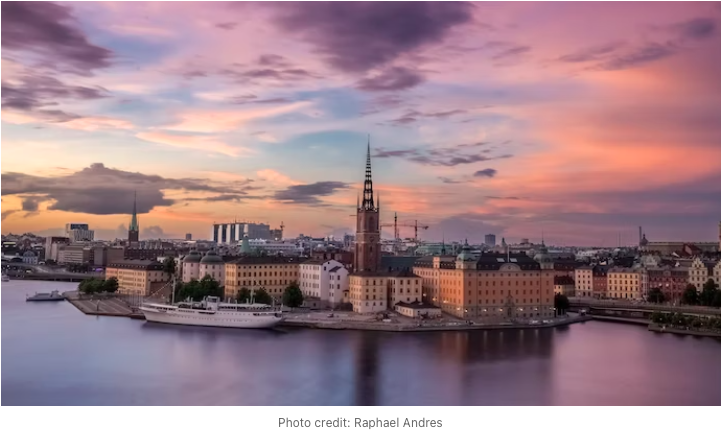This week I post from the beautiful city of Stockholm, Sweden with my Abodoo friends and colleagues from Education, Enterprise and the European Commissionto celebrate the Deep Tech Talent Initiative. Even though the focus of the year ahead is on Skills, underpinning this is a real investment, focus and passion to develop Green Skills. So we thought we could deep dive on such this hot area “excuse the pun” to understand it more from a country that has really embraced investment in sustainability talent and the role each of us can play and in turn greatly benefit from.
What are Green Skills?
Green skills refer to the knowledge, abilities, and competencies required to work in a sustainable and environmentally friendly manner. These skills are specifically focused on addressing environmental challenges, promoting sustainable practices, and supporting the transition to a greener economy.
Green skills can be broadly categorised into two main areas:
- Technical Green Skills: These skills are related to specific sectors or occupations that directly contribute to environmental sustainability. Examples include expertise in renewable energy technologies, waste management, water conservation, sustainable agriculture, eco-friendly construction, environmental engineering, and resource efficiency.
- Transversal Green Skills: These skills are more generic and applicable across various industries and job roles. They involve the ability to understand and integrate sustainability principles into different contexts. Transversal green skills include environmental management, environmental policy analysis, sustainable project management, green finance and investment, life cycle assessment, environmental auditing, and environmental legislation and regulations.
Whats the importance of Developing Green Skills Globally?
Several factors are contributing to the increasing importance of the global development of green skills:
- Environmental Concerns: The world is facing significant environmental challenges such as climate change, biodiversity loss, air and water pollution, and resource depletion. Addressing these issues requires individuals with the knowledge and skills to mitigate and adapt to these challenges in various sectors.
- Policy and Regulation: Governments and international bodies are implementing policies and regulations to promote sustainable practices and transition to a greener economy. These policies often require organisations and individuals to comply with environmental standards, creating a demand for professionals with green skills to ensure compliance and drive sustainable initiatives.
- Growing Green Sectors: The renewable energy, energy efficiency, sustainable agriculture, green construction, and waste management sectors are experiencing rapid growth. These sectors provide opportunities for job creation and economic development, requiring a workforce equipped with the necessary green skills to support and drive this transition.
- Business Competitiveness: Many businesses are recognising the value of sustainability and incorporating environmental considerations into their strategies. Employers seek professionals who understand sustainable practices, as they can contribute to cost savings, innovation, improved reputation, and compliance with environmental standards.
- Consumer Demand: Consumers are increasingly conscious of the environmental impact of products and services. They favour businesses that demonstrate sustainability practices, leading companies to prioritise green initiatives and hire individuals with green skills to meet consumer demands.
Given these factors, individuals who possess green skills have a competitive advantage in the job market. Moreover, fostering a workforce with green skills is crucial for achieving environmental sustainability goals, promoting green innovation, and driving the transition to a low-carbon and resource-efficient economy. According the World Economic Forum, the green sector offers enormous potential for job creation in the coming years, but we have to make sure that all citizens, no matter their socio-economic and educational background, can harvest its benefits in full, especially under-represented and marginalised communities: youth, migrants and women are at risk of being excluded from the green economy.
What is happening in Europe and APEC?
Green skills are increasingly important in the modern workforce due to the growing awareness of environmental issues and the need for sustainable practices. They enable individuals to contribute to reducing carbon emissions, promoting energy efficiency, minimising waste and pollution, and adopting environmentally friendly approaches in their respective fields. Globally, the development of green skills is crucial for addressing climate change, creating sustainable economies, promoting social equity, enhancing resilience, fostering innovation, and improving health and well-being. It is an investment in a sustainable future that benefits individuals, communities, and the planet as a whole.
The development of green skills is no longer optional but has become a necessity. Since 2019, the European Green Deal(EGD) is the EU’s new growth strategy, aimed at transforming the EU into a fair and prosperous society, with a modern, resource-efficient and competitive economy – one where there are no net emissions of greenhouse gases in 2050 and where economic growth us decouple from resource use.
New international agreements combining climate and trade are also currently emerging in the Asia Pacific. Singapore recently signed a green economy agreement with Australia and climate change partnerships with Indonesia and the United States. Its enhanced bilateral partnership with New Zealand also has a new pillar on climate change and the green economy. Additionally, other countries in the region are also developing such climate-oriented economic cooperation. Through work undertaken in the different working groups and committees, APEC can provide templates and model measures to shape the form and substance of these agreements.
In the EU, more than 1 million solar workers will be needed by 2030 to meet higher renewable energy targets set recently to end the region’s reliance on Russian oil and gas. In 2022 alone, solar employment in the EU rose by an estimated 30%. With many countries and companies around the world making pledges to reduce emissions, the clean energy transition seems to be an inevitability. And that transition will undoubtedly have an impact on employment, as the demand for cleaner fuels shifts attention away from fossil fuels. However, it’s quite likely that not every sector will see a net gain of employment.
According to research by Accenture, more than three-quarters of young people in Asia-Pacific want a green job within a decade, but there won’t be enough green jobs in the region to meet demand. Three out of four young people in APEC aspire to get a green job within the next decade, outpacing youth elsewhere in the world in gravitating towards careers – and organisations – that have an environmentally sustainable agenda.
Conclusions
Environmental issues transcend national borders, and addressing them requires global collaboration. Green skills enable professionals to work together across countries and cultures, sharing knowledge, best practices, and innovations to tackle shared environmental challenges. Additionally, green skills are necessary globally to promote environmental sustainability, create jobs, stimulate economic growth, enhance resilience, improve resource efficiency, raise awareness, and foster global collaboration. Developing a skilled workforce equipped to address these challenges is crucial for a sustainable future.
To meet the demand for green skills, educational institutions, vocational training centres, and professional development programs are expanding their offerings to include courses and certifications related to sustainability and environmental practices. Governments and organisations are also investing in skill development programs to enhance the green competencies of the workforce. No single entity can meet this reskilling challenge alone. The key will be to establish multistakeholder partnerships to prepare the world’s workforce for the green economy.
Developing green skills not only enhances career opportunities in emerging green sectors but also supports the overall goal of achieving a more sustainable and resilient society. Governments, educational institutions, and organisations are recognising the importance of integrating green skills into training programs, curriculum development, and workforce development strategies to meet the demands of a greener future.
Key Takeaways
The development of ‘Green’ skills is crucial for several reasons:
- Addressing climate change: Green skills are focused on sustainable practices and technologies that help mitigate climate change. By developing these skills, individuals can contribute to efforts aimed at reducing greenhouse gas emissions, transitioning to renewable energy sources, and promoting sustainable lifestyles. This is vital for combating climate change and its negative impacts on the environment and society.
- Creating a sustainable economy: The transition to a green economy requires a skilled workforce that can drive innovation, implement sustainable practices, and develop environmentally friendly technologies. Green skills are essential for developing and maintaining green industries such as renewable energy, energy efficiency, sustainable agriculture, waste management, and eco-tourism. Investing in these skills can lead to job creation, economic growth, and long-term sustainability.
- Promoting social equity: The green sector provides opportunities for inclusive growth and social equity. Developing green skills helps create job opportunities in sectors that prioritise environmental sustainability, which can lead to a more equitable distribution of wealth and resources. It enables individuals from diverse backgrounds and communities to participate in the green economy and benefit from its potential.
- Enhancing resilience and adaptation: Green skills include knowledge and expertise in climate resilience and adaptation strategies. With the increasing frequency and severity of climate-related events, such as extreme weather events and rising sea levels, having the skills to adapt to and mitigate these challenges becomes essential. Green skills enable individuals and communities to better prepare for and respond to climate impacts, ensuring greater resilience and the ability to thrive in a changing world.
- Fostering innovation and competitiveness: Green skills drive innovation by encouraging the development and adoption of sustainable technologies, practices, and business models. They enable individuals to think creatively and find solutions to environmental challenges. By fostering innovation, green skills contribute to the competitiveness of businesses, industries, and economies on a global scale.
Improving health and well-being: Green skills are often associated with improved health and well-being outcomes. For example, skills related to sustainable agriculture promote organic farming and reduce the use of harmful pesticides, leading to healthier food systems. Skills in energy efficiency contribute to reducing air pollution and improving indoor air quality. By promoting sustainable and environmentally friendly practices, green skills contribute to a healthier and more sustainable living environment.


